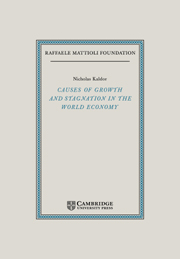Book contents
- Frontmatter
- Contents
- Preface
- Acknowledgements
- CAUSES OF GROWTH AND STAGNATION IN THE WORLD ECONOMY
- FIRST LECTURE Equilibrium Theory and Growth Theory
- SECOND LECTURE Alternative Approaches to Growth Theory
- THIRD LECTURE The Problem of Intersectoral Balance
- FOURTH LECTURE The Effects of Interregional and International Competition
- FIFTH LECTURE Policy Implications of the Current World Situation
- DISCUSSION
- NICHOLAS KALDOR, A BIOGRAPHY, by A. P. Thirlwall
- BIBLIOGRAPHY OF THE WORKS OF NICHOLAS KALDOR, compiled by Ferdinando Targetti
- BIBLIOGRAPHY OF WORKS CITED
- LIST OF ABBREVIATIONS
- INDEX
- Cambridge Cultural Social Studies
FOURTH LECTURE - The Effects of Interregional and International Competition
Published online by Cambridge University Press: 23 December 2009
- Frontmatter
- Contents
- Preface
- Acknowledgements
- CAUSES OF GROWTH AND STAGNATION IN THE WORLD ECONOMY
- FIRST LECTURE Equilibrium Theory and Growth Theory
- SECOND LECTURE Alternative Approaches to Growth Theory
- THIRD LECTURE The Problem of Intersectoral Balance
- FOURTH LECTURE The Effects of Interregional and International Competition
- FIFTH LECTURE Policy Implications of the Current World Situation
- DISCUSSION
- NICHOLAS KALDOR, A BIOGRAPHY, by A. P. Thirlwall
- BIBLIOGRAPHY OF THE WORKS OF NICHOLAS KALDOR, compiled by Ferdinando Targetti
- BIBLIOGRAPHY OF WORKS CITED
- LIST OF ABBREVIATIONS
- INDEX
- Cambridge Cultural Social Studies
Summary
We have so far not considered the economic problem in its spatial aspect – except indirectly, in dealing with the trade between primary products and industrial goods, which may be supposed to involve the exchange of goods produced in different areas. Since primary products are “land-based industries”, they are geographically spread. Industrial activities, on the other hand, for reasons we have not yet considered, tend to be concentrated in urban areas. The exchange between agricultural products and manufactured goods can also be looked upon as an exchange of the products of town and country.
There is a certain difference between the two kinds of activities in that, while both benefit from specialisation and exchange, the individual producer devotes only a part of his product (if any) to his own consumption (and that of his family) and obtains the greater part by way of exchange; the agricultural producer could, in theory, produce only for his own consumption. The industrial producer, on the other hand, can only operate in a social setting: his activities are dependent on the demand for his services, or on the products of his labour, by others. The industrial producer, whether he is an artisan producing on a small scale mainly by his own labour, or a manufacturer with many employees, is engaged in producing for the market, and his success or failure depends on the strength of the market demand for his products.
- Type
- Chapter
- Information
- Causes of Growth and Stagnation in the World Economy , pp. 55 - 70Publisher: Cambridge University PressPrint publication year: 1996



